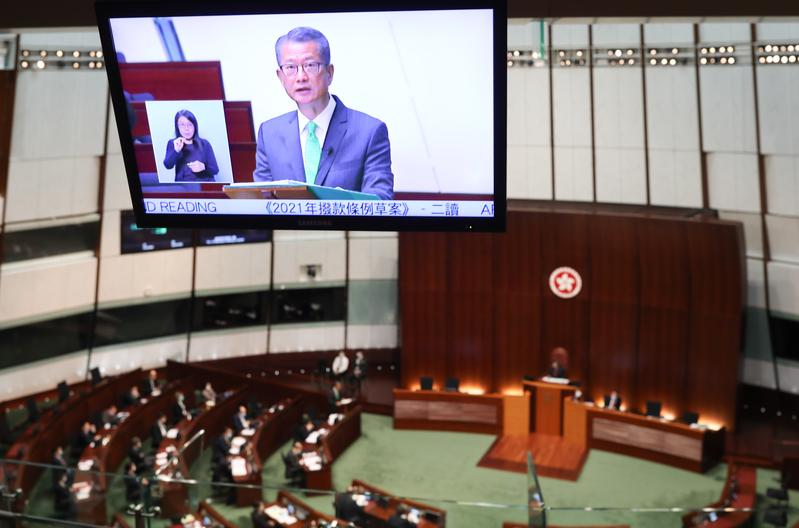 Financial Secretary Paul Chan Mo-po on Wednesday announces measures to create a citywide green ecosystem in his budget speech. (CALVIN NG / CHINA DAILY)
Financial Secretary Paul Chan Mo-po on Wednesday announces measures to create a citywide green ecosystem in his budget speech. (CALVIN NG / CHINA DAILY)
The HK$12 billion ($1.55 billion) budget for Hong Kong’s innovation and technology development will expedite the city’s digital transformation after the COVID-19 pandemic, and enhance its role as a tech hub, experts say.
Financial Secretary Paul Chan Mo-po on Wednesday revealed that level of expenditure on I&T in the 2021-22 budget, with favorable policies covering the digital economy, talent nurturing and introduction, infrastructure, research and development, as well as startups.
Under a HK$200 million budget, the government will roll out a “Knowing More About IT” program in primary schools, providing up to HK$400,000 to each school in the coming three school years
In the past three years, the government has allocated over HK$100 billion to support I&T development. “Despite the huge challenges imposed by the pandemic as well as the internal and external environments, I am convinced that the promotion of I&T is the right direction for the long-term development of Hong Kong,” Chan said.
READ MORE: HK budget forecasts return to growth, cash coupons pledged
Under a HK$200 million budget, the government will roll out a “Knowing More About IT” program in primary schools, providing up to HK$400,000 to each school in the coming three school years, to prepare the younger generation for a digital economy.
The government will regularize the program to subsidize local university students majoring in science and technology for short-term I&T-related internships.
ALSO READ: HK$120b relief package to put city back on track
Besides, a Global STEM Professorship Scheme will be launched in the first half of this year, to support universities in attracting world-renowned I&T scholars and their teams to participate in science, technology, engineering and math teaching and research. The program will cost about HK$2 billion.
“Talents are vital to the development of innovation and technology,” said Agnes Wong, a tax partner with PwC Hong Kong. She believes the fund in education and internships on I&T will help achieve the city’s target to become an international I&T hub. She expects efficient implementation of an I&T related budget to turn the investment into economic growth.
On research and development, the financial chief announced a HK$4.75 billion injection per year to the Innovation and Technology Fund for two years to sustain its 17 funding programs and the work of over 50 R&D laboratories in the next three years.
William Wong Kam-fai, associate dean of the Faculty of Engineering at the Chinese University of Hong Kong, said the fund is a more pressing need for local R&D, as the economy has to expedite digital transformation post-pandemic.
To support startups, the government-owned Hong Kong Science and Technology Parks Corporation and Cyberport will inject HK$350 million and HK$200 million into their existing Corporate Venture Fund and Cyberport Macro Fund respectively, and extend the scope to cover Series B and later-stage investments.
Wong noted that private investment in startups has been shrinking under the pandemic. Thus, the government fund, especially in later stage financing, is vital to local tech startups.
On the digital economy, the government will allocate HK$375 million to the Hong Kong Trade Development Council in the coming three years to develop virtual platforms to enhance its capability to organize online activities and to proceed with digitalization.
Welcoming the measure, HKTDC Chairman Peter Lam Kin-ngok said the organization will build a robust virtual platform supported by the latest technology to offer a seamless online-to-offline experience for buyers and sellers, helping local and global companies capture opportunities with greater ease and precision.
“Even when the pandemic subsides, a physical-cum-virtual hybrid model will likely be the new norm. It is therefore of utmost importance to help enterprises accelerate their digital transformation,” Lam said in a news release.


